book 2 unit 4 language points
新课标人教版必修二Book2 Unit4 language points
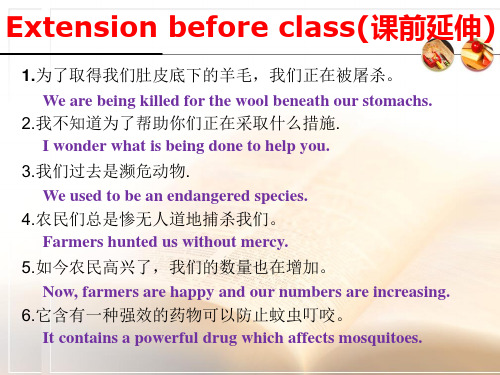
7. What must be done if wildlife protection is to succeed? 如果野生动物保护要想成功的话必须要做什么?
If 1) you want to succeed, you must work hard. 要想成功,你必须苦干。 With his help, I susk on time. 2) 在他的帮助之下,我成功的按时完成了任务。
Extension before class(课前延伸)
1.为了取得我们肚皮底下的羊毛,我们正在被屠杀。 We are being killed for the wool beneath our stomachs. 2.我不知道为了帮助你们正在采取什么措施. I wonder what is being done to help you. 3.我们过去是濒危动物. We used to be an endangered species. 4.农民们总是惨无人道地捕杀我们。 Farmers hunted us without mercy.
5.如今农民高兴了,我们的数量也在增加。 Now, farmers are happy and our numbers are increasing. 6.它含有一种强效的药物可以防止蚊虫叮咬。 It contains a powerful drug which affects mosquitoes.
3.Daisy一直都渴望帮助那些濒临灭绝的野生动植物。 Daisy had always longed to help endangered species of wildlife.
渴望得到… long to do sth. 渴望干… long for sth.______ 1) I longed to see you again. 我盼望再见到你。 2)_________________________________________ She longed to go home for a holiday to see her families again 她渴望放假回家,再次见到她的家人。 3) Children always longed to have a holiday. ____________________________
高中英语北师大版必修1文档Unit 2 Section Ⅳ Lesson 2 & Lesson 3 — Language Points Word版含答案
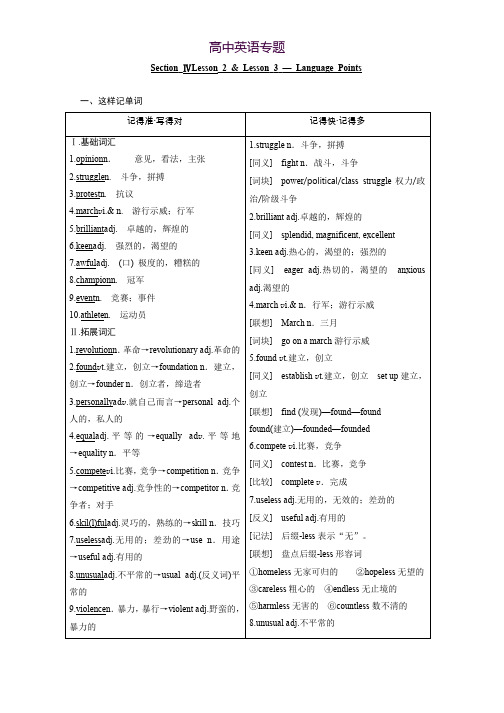
Section_ⅣLesson_2_&_Lesson_3_—_Language_Points 一、这样记单词1.(教材P24)He led the 1911 revolution and founde d the first republic of China.他领导了1911年革命,并成立了第一个中华民国。
found vt.建立,创立,创办创建于20世纪初期的这所学校一直激励着孩子们对于艺术的热爱。
②As we all know, a good relationship has to be founded on/upon trust.众所周知,良好的关系必须建立在信任的基础上。
2.(教材P25)His first victory was to win the equal rights for blacks to sit on buses. 他的第一次胜利是为黑人赢得了坐公交车的平等权。
equal(1)adj.平等的;相等的;胜任的妇女要求同工同酬。
②No one is equal to him in courage, about which every one knows.在勇气方面没有人比得上他,这一点大家都清楚。
③I even don’t know a pound is roughly equal to 500 grams, so I’m not equal to doing (do) the job.我甚至连一磅约等于500克都不知道,所以我不能胜任做这项工作。
(2)vt.不管是容貌还是在舞艺上我们都比不上她。
(3)n.相等的事物,同等的人It is reported that he is a player without_equal.据报道他是个无与伦比的运动员。
3.(教材P24)struggle n.斗争,拼搏;努力v.挣扎;奋斗;努力struggled to lead an active life.海伦·凯勒19个月大时就变得又聋又瞎了,但她从不放弃并努力过积极的生活。
2019-2020英语选修八讲义:Unit 2 Section Ⅳ Language Points (Ⅱ) 含答案

Section Ⅳ Language Points (Ⅱ) (Wordpower,Grammar and usage & Task)Ⅰ.单词拼写根据汉语或首字母提示,写出下列单词1.He is fond of listening to the old Spanish folk (民间的) song.2.Madonna's song topped the charts (排行榜) for over ten weeks.3.They fought for their motherland (祖国) shoulder to shoulder.4.This is one of the songs from her latest album (音乐专辑).5.We chorused “Good morning!” when the teacher came in.6.The man cleared his throat and continued to speak aloud.7.The children learn singing,dancing,drawing,and reading in the kindergarten.8.His parents employed a tutor to teach him Greek.Ⅱ.拓展词汇根据词性和汉语提示,写出下列单词1.Austria n.奥地利→Austrian→adj.奥地利的n.奥地利人2.employ v.雇佣→employment n.职业→unemployment n.失业3.collect v.收集→collection n.作品集;收藏品;一批(人或物品);取走4.compose v.作曲→composer n.作曲者,作曲家Ⅲ.补全短语根据提示补全下列短语1.apply for申请2.take part /participate in参加;参与3.look up查找;向上看4.leave out遗漏;省略;不考虑5.put up张贴;举起;搭建;为……提供住宿6.give up 中止;停止;放弃7.split up 分手,分裂;断绝关系8.try out for sth.参加……选拔赛Ⅳ.选词填空选用上述短语的适当形式填空1.She left out an “m” in “accommodation”.2.John is trying out for the school play for a second time.3.Can you look up the opening times on the website?4.She would sooner resign than take part /participate in such dishonest business deals.5.Don't apply for that job.You're in danger of overreaching yourself.背教材原句记句式结构仿写促落实1.What instrument do youthink I should learn ?你认为我应该学习哪种乐器?do you think 作插入语。
Unit4+Language+points+1课件-高中英语外研版(2019)必修第二册

4. ... but the music, exaggerated movements and mime helped get the meaning across to the audience. 但观众可以借助伴奏、夸张的动作和形体模仿来 理解表演内容。
get across (to...) to succeed in communicating an idea or a piece of information to sb. 让…… 理解,传达……给……
5. Using such techniques, the opera had transformed a small stage into the whole universe. 通过这些方法,京剧将小小的舞台变成了浩 瀚的宇宙。
transform...into... to change or convert one thing into another thing. 把……转变成……
start with at the beginning. 以……开始
①We'll start with the easy example first. 我们将先从一个容易的例子开始。 ②To work out a plan, one has to start with investigation(调查研究). 制定计划要从调查研究开始。
one's seat) _I_w__a_s_o_n__th_e__e_d_g_e_o_f_m__y_s_e_a_t_d_u__ri_n_g__th_e____ _m__a_tc_h_._______________________________
Try to memorize these useful expressions.
全新版大学英语综合教程第二册教案Unit4
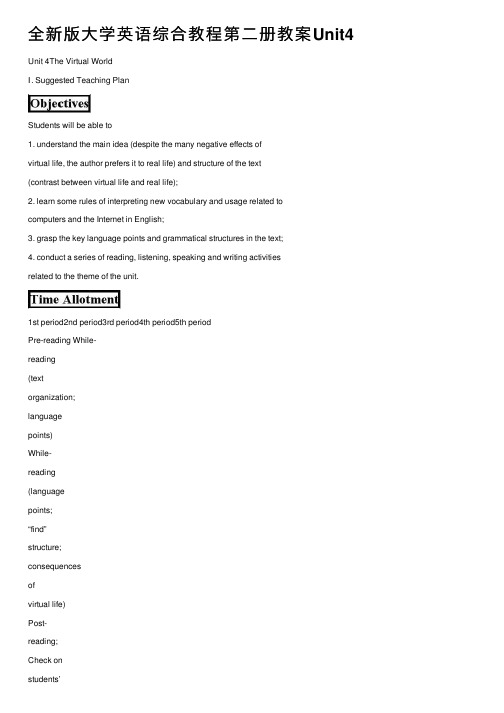
全新版⼤学英语综合教程第⼆册教案Unit4 Unit 4The Virtual WorldⅠ. Suggested Teaching PlanStudents will be able to1. understand the main idea (despite the many negative effects ofvirtual life, the author prefers it to real life) and structure of the text(contrast between virtual life and real life);2. learn some rules of interpreting new vocabulary and usage related tocomputers and the Internet in English;3. grasp the key language points and grammatical structures in the text;4. conduct a series of reading, listening, speaking and writing activitiesrelated to the theme of the unit.1st period2nd period3rd period4th period5th periodPre-reading While-reading(textorganization;languagepoints)While-reading(languagepoints;“find”structure;consequencesofvirtual life)Post-reading;Check onstudents’homereading(Text B)Theme-RelatedLanguageLearn-ing Tasks1. T asks Ss the following questions on the poem Surfing the Internet:(5minutes)* What was the hero doing when his boss came in? (surfing the Internet) * How did he act in front of his boss? (He pretended to be surprised at the computer which had crashed “unexpectedly”.)2. Ss look at the theme of this unit (The Virtual World) and the title of TextA (A Virtual Life), then try to: (10 minutes)* find antonyms of “virtual world” and “virtual life”; (real world, real life) * suggest synonyms for “virtual world”; (cyberspace, cyberia, etherworld, virtual reality, Internet world, net world, etc.)* say what people can do on the Internet, (communicating with people, shopping, reading, entertainment, education, working, hacking, publishing, etc.)3. Imaginative writing(28 minutes)1) T dictates to Ss the following paragraph:For the past two weeks, other participants of the Net Survival Contest (⽹络⽣存竞赛)and I have been shut up in bare hotel rooms.Our only link to the real world has been a computer that is hooked up to the Internet (联⽹电脑). We have relied on it, not only for food, bed sheets and other daily necessities, but also to set up an e-business (电⼦商务)of our own.2) Now Ss will complete the next paragraph beginning with: “Now it istime for me to walk out into the light of day again...” They willgive their imagination full play. They will write no more than 100words.3) Ss form groups of four to five, and read aloud to each other theirown writings.4) T asks some groups to recommend the best piece in their group tothe class.4. T may lead in to Text A by saying: Some of us like to live a life in contact with real things and real people, but others favora virtual existence. Which life is better? I’m sure you have different opinions. Now let’s read Text A to find out what Maia Szalavitz has to say about these two life styles. (2 minutes)1. Text organization (15 minutes)1) T draws Ss’ attention to Text Organization Exercise 1, and lets themread its instructions as well as what has already been done for them in this exercise.2) Ss try to complete the exercise by simply reading the first sentence ofeach paragraph in Text A.1) Ss compare answers with each other; if necessary, T may help.2. T explains the key language points and gives Ss practice (see LanguageStudy). (45 minutes)3. T guides Ss through Structure Exercise 2. (10 minutes)2. Ss re-read Paras 4-10, work in pairs to find out consequences of “my”virtual life. Can they use the “find oneself + adj./ past participle/present participle” structure when summing up the conse-quences? (10 minutes)3. Some pairs report to the class their findings, using the “find” structure.(5 minutes)1. Computer-related vocabulary items (20 minutes)1) Ss scan Text A to find out vocabulary items related to computer andthe Internet. (They are: virtual life, the net, telecommuter, email,Internet mailing lists, computer-assisted, data, link, cyber-interaction, on line, system crash, click on the modem, connection,password)2) T tells Ss that new terms related to computer and the Internet areconstantly added to the English vocabulary, so much so that many ofthem are not included in any English dictionary. However, if weapply certain rules, their meanings are easy to deduce.3) T gives Ss more examples of computer-related vocabulary items (seeText Analysis).2. T guides Ss through some after-text exercises. (25 minutes)3. T checks on Ss’ home reading (Text B). (3 minutes)4. Ss do Part IV: Theme-Related Language Learning Tasks. (1 period)5. T asks Ss to prepare the next unit: (2 minutes)1) do the pre-reading task;2) preview Text A.Ⅱ.Text AnalysisThe most dynamic combining forms/prefixes for new computer-and-Internet-related vocabulary in English are cyber-, virtual, Net- (net-), Web-(web-), and E- (e-).New English vocabulary items derived from them usually appear in the following forms:1. combining forms/prefixes + noun: this is the most common type, e.g.virtual life (虚拟⽣活), virtual world (虚拟世界), virtualcommunity(虚拟社区), virtual office (虚拟办公室), virtual pet (虚拟宠物),virtual reality (虚拟现实),cyber-interaction (⽹络互动),cyberculture(⽹络⽂化),cybernut (⽹⾍), cyberpet(电⼦宠物),cyberspace (⽹络空间), netwriter(发送电⼦邮件的⼈),nethead (⽹⾍), Webmaster (⽹站维护者), Web page (⽹页), website (⽹站),WebTV (⽹络电视机), E-book (电⼦书籍), E-shopper (⽹上购物者), e-card (电⼦贺卡), e(-)mail (电⼦邮件), e-journal (电⼦杂志),e-business (电⼦商务), e-cash (电⼦货币), e-commerce (电⼦商务). 2. combining forms/prefixes + verb: e.g. cybersurf (⽹络漫游), netsurf (⽹络漫游), websurf (⽹络漫游),email (发送电⼦邮件)3. words like cyber, net, etc. + suffix: e.g. cyberian (cyber + ian, ⽹络⽤户), cyberphobia (cyber + phobia, 电脑恐惧症), cybernaut (cyber +naut ⽹络⽤户), netter (net + er ⽹民), Webify (web + fy 使万维⽹化), cyberize (cyber + ize, 使联⽹).4. clipped word: cyberdoc (cyber + doctor, ⽹络医⽣), Netcast (Net +broadcast,⽹络播放), Netiquette (Net + etiquette, ⽹规), Netizen (Net+ citizen, ⽹民,), Netpreneur (Net + entrepreneur, ⽹络企业家),Webcam (Web + camera, ⽹络摄像机), Webcasting (Web + broadcasting,⽹络播放), Webliography (Web + bibliogrpahy, ⽹络书⽬), Webnomics (Web + economics, ⽹络经济), Webzine (Web +magazine, ⽹络杂志), e-tailing (electronic + retailing,电⼦零售), e-zine (electronic + magazine,电⼦杂志)Ⅲ. Cultural Notes1. the Internet: an international computer network for the exchange of information. It was originally used mainly in the academic and military worlds but has since become available to the large and increasing number of people with personal computers. Other services, e.g. the World Wide Web, are available through it.The Internet is changing our lives and a parallel universe is rapidly emerging online. Today there’s scarcely an aspect of our life that isn’t being upended by the torrent of information available on the hundreds of millions of sites crowding the Internet, not to mention its ability to keep us in constant touch with each other via electronic mail. The Internet is saving companies billions of dollars in producing goods and serving the needs of their customers. Nothing like it has been seen since the beginning of the Industrial Revolution, when power-driven machines began producing more in a day than men could turn out in nearly a year. The Internet and e-commerce are viewed as a global megatrend along the lines of the printing press, the telephone, the computer and the electricity.You would be hard pressed to name something that isn’t available on the Internet. Consider: books, health care, movie tickets, baby clothes, stocks, real estate, toys and airline tickets. American kids today are so computer savvy that it virtually ensures the United States will remain the unchallenged leader in cyberspace for the foreseeable future. Most kids use computers to play games and have email chats with friends.What’s clear is that, whether we like it or not, the Internet is an ever-growing part of our lives and there is no turning back. 2. NBC (the National Broadcasting Company): the first of the originalthree US national broadcasting companies. It was established in 1926by Radio Corporation of America as two groups of radio stations. Thefirst NBC television channel opened in 1940. The company is nowowned by General Electric. Its main offices are at Rockefeller Centerin New York.3. PBS (the Public Broadcasting Service): (in the US) a televisionsystem that broadcasts programs to an association of local stationswhich use no television advertisements and do not make a profit. Itwas established by the Public Broadcasting Act and is supported bymoney from the US Government, large companies and the public.PBS is known for the high quality of its programs.4. ABC (the American Broadcasting Company): one of the original threemajor television networks in America. It began in 1943 as the BlueNetwork of six radio stations. ABC is now owned by the Walt DisneyCompany .Ⅳ. Language Study1. virtual: 1) created and existing only in a computerExamples: I can visit a virtual store and put what I want in my basket atthe click of a mouse button.Some people spend too much time escaping from reality intothe virtual world conjured up on their computer screens.2) being or acting as what is described, but not accepted as such inname or officiallyExamples: Our deputy manager is the virtual head of the business.Now that the talks have broken down, war in the region looks like a virtual certainty.2. interpret: 1) understand (sth. said, ordered, or done)Examples: They are worried that the students might interpret the new regulation as a restriction of their rights. She interprets the dream as an unconscious desire to be young again.2) give or provide the meaning of,explainExamples: How do you interpret his refusal tosee us?This dream can be interpreted in several different ways.3) translate what is said in one language into anotherExamples: I am terribly sorry, but I don’t understand a word. Could you interpret for me?No one in the tour group spoke Spanish so we had to ask the guide to interpret.3. tone: a particular quality or intonation of the voiceExamples: From the tone of her voice I could tell she was very angry.Suddenly he laughed again, but this time with a cold, sharptone.4. stretch: (cause to) become longer, wider, etc. without breakingExamples: My working day stretches from seven in the morning toeight at night.The child stretched the rubber band to its full extent.5. submit: give (sth.) to sb. so that it may be formally considered (followed by to)Examples: You should submit your reports to the committee.I am going to submit an application for that job in Microsoft.Peter submitted his plans for the new town square to the local government.6. edit: revise or correctExamples: Jack is busy editing Shakespeare’s plays for use in schools.John didn’t finish editing the annual report until the end of lastmonth.7. email: electronic mailExamples: Young people like to keep in touch with their friends via email.I received an email from my studentyesterday.vt. send an email toExamples: I will email you the instant I get thenews.She’ll email me a question before she calls so I can think it overin advance.8. communicate: contact sb. in any way, esp. by speaking to them, writing to them or calling them (followed by with) Examples: Some young people depend heavily on email to communicate with each other.They have been divorced for years and never communicated with each other.9. the Internet: the worldwide network of computer links which allows computer users to connect with computers all over the world, and which carries electronic mailExamples: Whether we like it or not, the Internet is an ever-growing partof our lives.You can take online courses and earn your degree via theInternet whenever and wherever you want to.It’s believed the Internet was born in 1969 when twocomputers at the University of California, Los Angeles wereconnected by a 15 foot cable.10. relationship: state of being connectedExamples: What is the relationship between language and thought?The scientist had a good working relationship with his Americancolleagues.11. at times: sometimesExamples: She has been away from her home for about a year. At times she wishes she had never left. He went on listening to her, at times impatient and at times fascinated.12. take in: absorb (sth.) into the body by breathingor swallowingExamples: The earth takes in heat and light fromthe sun.Fish take in oxygen through their gills.13. data: information, usu. in the form of facts or statistics thatyou can analyzeExamples: This data is stored on the network and can beaccessed by anybody.The data is still being analyzed, so I can’t tell you the results.14. spit: send (liquid, food, etc.) out from the mouth (used in the pattern: spitsth. (out) (at/on/onto sbJsth.))Examples: The baby spat its food out on the table.He took one sip of the wine and spat it out.15. on line: connected to or controlled by a computer(network)Examples: Our system is on line to the maincomputer.The largest online institution is the University of Phoenix, withsome 1000 students today and hopes of reaching 200,000 studentsin 10 years.16. symptom: 1) sign of the existence of sth. badExamples: High interest rates are a symptom of a weak economy.They regard the increase in crime as a symptom of a more generaldecline in moral standards.2) change in the body that indicates an illnessExamples: A cold, fever and headache are the usualsymptoms of flu.If the symptoms persist, it is important to go to your doctor.17. nightmare: a terrifying dreamExamples: Tom didn’t eat fish because it gives him nightmares.Watching horror films gives menightmares.I had a nightmare about falling off theskyscraper.18. conversely: in a way that is opposite to sth.Examples: $1 will buy 100 yen worth of Japanese goods. Conversely, 100 yen will buy $1 worth of American goods. You can add the fluid to the powder or, conversely, the powder to the fluid.19. but then: yet at the same timeExamples: The failure of China’s soccer team looks inevitable. But then, anything can happen in football.Mary performed better than the others in the final exam; but then,she spent much longer on it than they did.20. jar: have a harsh or an unpleasant effect (used in the pattern: jarsth., jar on sbJsth.)Examples: You shouldn’t have too many colors in a small space as the effect can jar.The loud bang jarred my nerves.Her squeaky voice jarred on me.21. suck in: (usu. passive) involve (sb.) in an activity, an argument, etc., usu.against their will (used in the pattern: suck sb. in/into sth.; suck in)Examples: I don’t want to get sucked into the debate about school reform.Some teenagers don’t want to get involved with gangs, but theyfind themselves getting sucked in.22. keep up with: learn about or be aware of (thenews, etc.)Examples: Carrie likes to keep up with the latestfashions.He didn’t bother to keep up with the news. His only concern wasto study.23. Work moves into the background: Work becomes secondary to me.24. in sight: 1) visibleExamples: It was early in the morning and there wasn’t anyone in sight oncampus.As the train pulled into the station my parents standing on theplatform were soon in sight.2) likely to come soonExamples: Two months passed, and victory was not yetin sight.The end of the economic nightmare is still nowhere in sight.A solution to the problem of environmental pollution now seemsin sight.25. remark: thing said or written as a commentExamples: The principal of the school made some remarks about educational reform at the meeting. Mr. Smith approached us and made a couple of remarks aboutthe weather.His rude remark about my book jarred on me.26. emotional: 1) of the emotionsExamples: She is grateful to him for his emotional support while she wasin trouble.It’s quite difficult to handle emotional problems.2) having emotions that are easily excitedExamples: Marie got very emotional when we parted, andstarted to cry.It’s said that the Italians are more emotional than we are.27. cue: anything that serves as a signal about what to do or say (followedby to / for)Examples: When he started to talk about the finances, that was our cue toget up quietly and leave.When I nod my head, that’s your cue to giveflowers to him.Mr. Clinton’s excitement was the cue for acampaign.28.1 say a line: I type a line on the screen.29. routine: a fixed and regular way of doing things (oftenadjectival)Examples: The job is really just a dull series of fairly routine tasks. I don’t think you’ll take it.He established a new routine after retirement.30. rely on/upon: depend confidently on, put trust inExamples: Nowadays we rely increasingly on computers to control theflow of traffic.Some children relied heavily on the advice of theirparents.31.abuse: wrong or bad use or treatment of sth./sb.Examples: The World Health Organization (WHO) has published a report on drug abuse and addiction.The policemen are making an investigationof child abuse.32. restore: bring back to a former condition (used in the pattern: restoresth.; restore sb. to sth.)Examples: Law and order will be quickly restored after the incident.Winning three games restored their confidence.Doing sports every day restored the old man to good health.The deposed king was restored to power.33. arrange: prepare or plan (used in the pattern: arrange sth.; arrange todo sth.; arrange for sb./ sth. to do sth.)Examples: Her marriage was arranged by her parents.Let’s arrange to have a dinner together some time before wegraduate.I have arranged for a taxi to pick us up at 8:00 a.m.I could arrange for you to come along with us if you like.34. flee: run away (from) (used in the pattern: flee from/to; fleesomeplace)Examples: The customers fled from the bank when the alarmsounded.During the war, thousands upon thousands of Afghans fled the country.Up to five million political refugees have fled to other countries.35. interview: 1) a meeting at which a journalist asks sb. questions inorder to find out their newsExamples: In an exclusive interview with our reporter, the film star revealed some of his personal affairs.Radio interviews are generally more relaxed than television ones.2) a formal meeting at which sb. applying for a job is askedquestions, as a way of judging how suitable they are Examples: I have been asked to go for an interview for a project I applied for at Harvard University.She has had a couple of job interviews, but nooffers.v.Examples: As a journalist, he interviewed manygovernment officials.After the press conference, the journalist interviewed the UN Secretary General about the Israeli-Palestinian conflict.I will be interviewed next week for the Chief Executive’s job.36. appointment: an arrangement to meet or visit sb. at a particular time (followed by with)Examples: You can’t see the president of the university unless you make an appointment.I’ve made an appointment to see my tutor tomorrow.37. click: press or release a mouse button rapidly, as to select an icon (followed by on)Example: When shopping online, you just click the mouse and order what you want to buy.38. tune: a series of musical notes that is pleasant andeasy to rememberExamples: She whistled a happy tune all the wayhome.He was humming a merry tune while cooking.。
Unit4 Language Points 阅读知识点课件-高中英语人教版选择性必修第二册

(2)please interj. 请(礼貌用语)
v.
使高兴,使满意
please oneself
乐意怎样就怎样
(3)pleased adj.
感到满意的;高兴的
be pleased with
对……感到满意
(4)pleasing adj.
令人满意的;令人高兴的(修饰物)
单句语法填空 1-1 (2018北京,书面表达, )I sincerely hope your dream will come true and it's my pleasure (please) to show you around in Beijing when that day comes. 句意:我真诚地希望你的梦想成真,而且我很高兴当那天到来时能带你到北京转转。 考查词性转换。根据空前面的形容词性物主代词my可知,此处需要用名词作表语。 1-2 (2017课标全国Ⅱ,语法填空, )Steam engines were used to pull the carriages and it must have been fairly unpleasant (pleasant) for the passengers, with all the smoke and noise. 句意:蒸汽机被用来拉动车厢,这对乘客来说肯定是令人相当不愉快的,因为烟雾和 噪音太大了。考查形容词。根据前面的have been可知,此处需要用形容词,再结合 句意可知应该填unpleasant,意为“使人不愉快的”。
eg The bell is massive, weighing over 40 tons. Masses of books covered every surface in the room.
英语高一必修二学案:Unit_4_Wildlife_protection_Period_2_Language_points_in_Warming_up_and_Reading
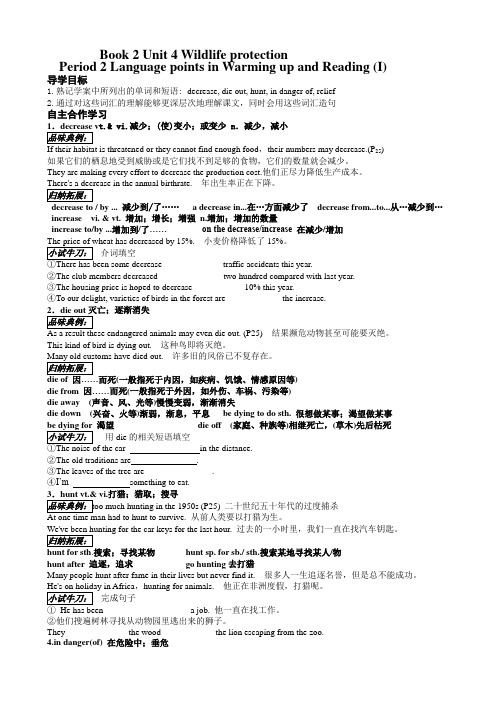
Book 2 Unit 4 Wildlife protectionPeriod 2 Language points in Warming up and Reading (I)导学目标1.熟记学案中所列出的单词和短语: decrease, die out, hunt, in danger of, relief2.通过对这些词汇的理解能够更深层次地理解课文,同时会用这些词汇造句自主合作学习v t.& vi.减少;(使)变小;或变少 n.减少,减小,their numbers may decrease.(P25)如果它们的栖息地受到威胁或是它们找不到足够的食物,它们的数量就会减少。
They are making every effort to decrease the production cost.他们正尽力降低生产成本。
年出生率正在下降。
减少到/了…… a decrease in...在…方面减少了decrease from...to...从…减少到…increase vi. & vt. 增加;增长;增强n.增加;增加的数量increase to/by ...增加到/了…… on the decrease/increase 在减少/增加小麦价格降低了15%。
介词填空②The club members decreased ______________ two hundred compared with last year.③The housing price is hoped to decrease ___________ 10% this year.④To our delight, varieties of birds in the forest are ____________ the increase.结果濒危动物甚至可能要灭绝。
This kind of bird is dying out. 这种鸟即将灭绝。
高中英语必修三教师用书:Unit 2 Section ⅣLanguage Points (Ⅱ) (Learning about Language)含答案
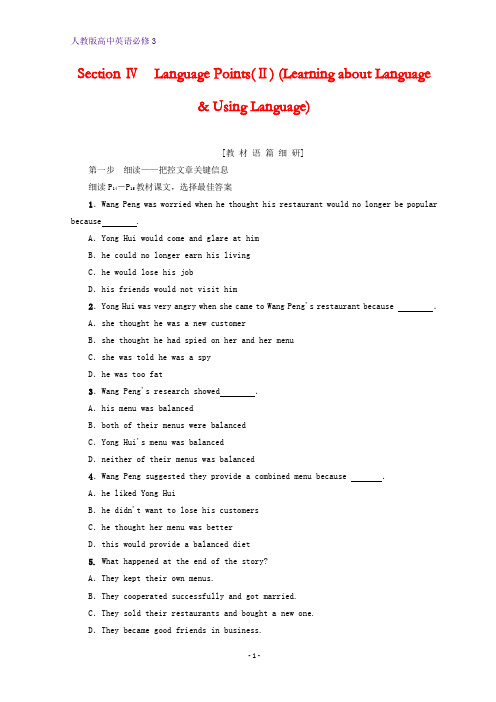
Section ⅣLanguage Points(Ⅱ) (Learning about Language& Using Language)[教材语篇细研]第一步细读——把控文章关键信息细读P14-P15教材课文,选择最佳答案1.Wang Peng was worried when he thought his restaurant would no longer be popular because .A.Yong Hui would come and glare at himB.he could no longer earn his livingC.he would lose his jobD.his friends would not visit him2.Yong Hui was very angry when she came to Wang Peng's restaurant because .A.she thought he was a new customerB.she thought he had spied on her and her menuC.she was told he was a spyD.he was too fat3.Wang Peng's research showed .A.his menu was balancedB.both of their menus were balancedC.Yong Hui's menu was balancedD.neither of their menus was balanced4.Wang Peng suggested they provide a combined menu because .A.he liked Yong HuiB.he didn't want to lose his customersC.he thought her menu was betterD.this would provide a balanced diet5. What happened at the end of the story?A.They kept their own menus.B.They cooperated successfully and got married.C.They sold their restaurants and bought a new one.D.They became good friends in business.【答案】1-5 BBDDB第二步精读——能力升华接轨高考根据P14-15教材课文,在空白处填入1个适当的单词或括号内单词的正确形式To his joy,people began coming to his restaurant again.He was able 1.to earn(earn) his living now.He didn't look forward to being 2.in debt.Then all of 3.a sudden Yong Hui walked in with 4.anger(angry).Wang Peng asked her to try a meal of his.Although enjoying the dumplings 5.served(serve) there,Yong Hui looked ill and felt sick with the fatty pork and all those heavy food.They chatted about offering a 6.balanced(balance) diet and providing a balanced menu to cut 7.down the fat and increase the fibre in the meal.They learned from each other.Before long Yong Hui put on more weight and Wang Peng became 8.slimmer(slim).9.In the end they decided to turn the two restaurants into a big one.They got 10.married(marry) and lived happily ever after![语言基础自测]Ⅰ.单词拼写根据汉语或首字母提示,写出下列单词1.There was no hope,so he sighed (叹气) with sadness.2.When will you pay off all the debts(债务)?3.We set a time limit(限定) of thirty minutes for the test.4.As students we should combine book knowledge with practice.5.The new law gains the support of farmers,who will benefit from the new law.6.You can consult a doctor about health problems.Ⅱ.拓展词汇根据词性和汉语提示,写出下列单词1.poison n.毒药;毒物→poisonous adj.有毒的2.limit vt.& n.限制;界限→limited adj.有限的→limitless adj.无限的3.benefit n.利益;好处vt.&vi.有益于;受益→beneficial adj.有益的;有好处的4.combine vt.&vi.使联合或结合→combination n.联合;结合5.cooperate vi.合作;协作→cooperation n.合作;协作Ⅲ.补全短语根据提示补全下列短语1.earn one's living谋生2.in debt欠债3.cut down削减,删节4.before long不久以后5.put on weight增加体重Ⅳ.选词填空选用上述短语的适当形式填空1.He earns his living by selling vegetables.2.Don't drink too much beer,or you will put on weight.3.You must cut down on sugar to lose weight.4.Wasteful people usually end up in debt.Ⅴ.经典句式仿写1.I don't want to upset you,but I found your menu so limited that I stopped worrying and started advertising the benefits of my food.我并不想让你心烦,不过我发现你的菜谱上的菜太有限了,所以我也就不担心了,我也开始宣传我的食物的好处了。
Language points in Book 4
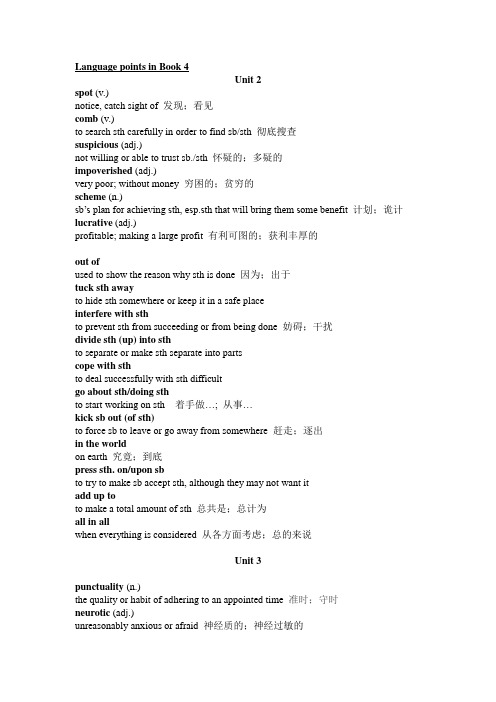
Language points in Book 4Unit 2spot (v.)notice, catch sight of 发现;看见comb (v.)to search sth carefully in order to find sb/sth 彻底搜查suspicious (adj.)not willing or able to trust sb./sth 怀疑的;多疑的impoverished (adj.)very poor; without money 穷困的;贫穷的scheme (n.)sb’s plan for achieving sth, esp.sth that will bring them some benefit 计划;诡计lucrative (adj.)profitable; making a large profit 有利可图的;获利丰厚的out ofused to show the reason why sth is done 因为;出于tuck sth awayto hide sth somewhere or keep it in a safe placeinterfere with sthto prevent sth from succeeding or from being done 妨碍;干扰divide sth (up) into sthto separate or make sth separate into partscope with sthto deal successfully with sth difficultgo about sth/doing sthto start working on sth 着手做…; 从事…kick sb out (of sth)to force sb to leave or go away from somewhere 赶走;逐出in the worldon earth 究竟;到底press sth. on/upon sbto try to make sb accept sth, although they may not want itadd up toto make a total amount of sth 总共是;总计为all in allwhen everything is considered 从各方面考虑;总的来说Unit 3punctuality (n.)the quality or habit of adhering to an appointed time准时;守时neurotic (adj.)unreasonably anxious or afraid 神经质的;神经过敏的extrapolate (v.)obtain a conclusion, make an inference 预测;推测unwarranted (adj.)not reasonable or necessary; not appropriate不合理的;不必要的;无正当理由的credence (n.)belief in sth as true 信任;相信exonerate (v.)to officially state that sb is not responsible for sth that they have been blamed for宣布(某人)无罪;免除责任stagger (v.)t o arrange people’s working hours, holidays, etc. so that they do not all begin and end at the same time 使错开;交错安排discard (v.)to get rid of sth that you no longer need 丢弃;抛弃a matter ofa situation that involves sth or depends on sth 关于…的事情be tolerant about/of/towards sthable to accept what other people say or do even if you don’t agree with it 对…忍受的;容忍的;宽容的give credence to sthbelieve sth (is true)take …for grantedto be so used to sb/sth that you don’t show that you are grateful 认为…理所当然;不把…当回事be guilty of sth(1)having done sth illegal 有罪的;犯…罪的(2)feeling ashamed of sth 感到内疚的;感到惭愧的once in a blue moonvery rarely 极为罕见;千载难逢Unit 4thrill (n.)a strong feeling of excitement or pleasure 兴奋;激动entice (v.)to persuade sb/sth to go somewhere or to do sth, usually by offering them sth 诱使;引诱depart (v.)to leave a place, esp. to start a trip 离开;离去;起程,出发assess (v.)to make a judgment about the nature or quality of sb/sth 评价;评定(性质、质量) concern (n.)sth that interests you because it is important to you 关心的事bond (n.)bond (between A and B) sth that forms a connection between people or groups, such as a feeling of friendship or shared ideas and experiences 纽带;联系;关系diminutive (adj.)(formal) very small 极小的;特小的;微小的captivating (adj.)taking all your attention; very attractive and interesting 迷人的;有魅力的;有吸引力的deprive sb/sth of sthto prevent sb from having or doing sth, esp. sth important 剥夺…;使丧失…;使不能享有capture sb’s heartto make sb. love 使…爱上;赢得某人的好感in anticipation ofanticipate…期待;预期<SYN> in prospect offigure out(1) to think about sb/sth until you understand them/it弄懂;弄清楚;弄明白(2) to calculate the amount or the cost of sth计算出(金额或成本)let sb/sth go || let go of sb/sth(1)to stop holding sb/sth 放开;松手(2)to give up an idea or an attitude, or control of sth 放弃;摒弃(想法、态度或控制) well up(of a liquid) to rise to the surface of sth and start to flow 涌出;冒出;流出;溢出Unit 5patronizing (adj.)showing that you feel better, or more intelligent than sb else 自认为高人一等的;摆派头的bestow (v.)(formal) to give sth to sb, esp. to show how much they are respected 给予;授予;献给restore (v.)to bring back a situation or feeling that existed before 恢复(某种情况或感受) pervasive (adj.)existing in all parts of a place or thing 遍布的;无处不在的uphold (v.)to support sth that is you think is right, fair, etc. and make sure that it continues to exist 支持;维护esteem (n.)great respect and admiration 尊重;敬重k eep one’s wordk eep one’s promise守信;遵守诺言fall apartgo to pieces; break up 破碎;破裂think twice (about sth/doing sth)think carefully 仔细考虑;再三考虑pave the way (for sb/sth)to create a situation in which sb will be able to do sth or sth can happen 铺路(为某人或某事创造条件)Unit 6indifferent (to sb/sth) (adj.)having or showing no interest in sb/sth 漠不关心;不感兴趣ecstasy (n.)a feeling or state of great happiness 狂喜;陶醉;入迷smother (v.)to cover sth/sb thickly or with too much of sth (用某物) 厚厚地覆盖lavish (v.)(written) to give a lot of sth, often too much to sb/sth 过分给予;滥施ubiquitous (adj.)seeming to be everywhere; very common 无所不在的;十分普遍的phenomenal (adj.)very great or impressive 了不起的;非凡的fastidious (adj.)being careful that every detail of sth is correct 一丝不苟的;严谨的elusive (adj.)difficult to find, define, or achieve 难找的;难以解释的;难以达到的attend to sb/sth(1)to deal with sb/sth 处理;对付(2)to take care of sb/sth 照料;关怀in the matter ofas to; as fa r as… is concerned 在…方面;就…而论derive from sthto come or develop from sth 起源于;来自with regard to sb/sth(formal) concerning sb/sth 关于;至于proceed with sthto continue doing sth that has already been started 继续做(或从事、进行)spring upto appear or develop quickly or suddenly 迅速出现;突然兴起part and parcel of sthan essential part of sth 重要部分;基本部分conform to(1)to agree with or match sth 相一致;相符合(2)to obey a rule, law, etc. 遵守,遵从,服从Unit 10veiled (adj.)not expressed directly or clearly 含蓄的;掩饰的assure (v.)(1)(assure sb of sth) to tell sb that sth is definitely true or definitely going to happen使…确信;向…保证(2)assure oneself (of sth)to make oneself certain about sth 弄清;查明forestall (v.)to prevent sth from happening or sb from doing sth by doing sth first 预先阻止;先发制人;在(他人)之前行动bespeak (v.)show, indicate, reveal 显示;证明monstrous (adj.)(1)shocking and unacceptable because it is morally wrong or unfair 丑恶的;道德败坏的(2)very large 巨大的exalted (adj.)(formal) full of great joy and happiness 兴奋的;兴高采烈的save (prep.)(old use or formal) except sth 除了;除…外self-assertion(n.)confidence that you have in speaking firmly about your opinions 自信;主见implore (v.)(formal) to ask sb to do sth in an anxious way because you want it or need it very much 恳求;哀求composedly (adv.)calmly, in a self-controlled manner 镇定地;沉着地be afflicted withsuffer from 受…折磨;患(病)impose sth on/upon sbto make sb accept the same opinions, wishes, etc. as your own 使(别人)接受自己的意见count for +程度词(nothing, everything, a great deal…)in face of/in the face ofwhen confronted with 面对;在…面前run riot(1)(of people) to behave in a way that is violent and/or not under control 撒野;肆意妄为(2)If your imagination, a feeling, etc. runs riot, you allow it to develop and continue,without trying to control it (指思想、情感等) 任意发挥;奔放。
高中英语 选择性必修四 unit4 language points

语境巧练 [完成句子] (1)他熟悉法语和德语,更不用说英语了。 He knows French and German well,not to mention English. (2)你现在出去踢足球太晚了,何况又正在下雨。 It’s far too late for you to go out and play football,not to mention the fact that it’s raining.
3. secondary adj.中学的:次要的:间接引发的
→
adv.其次
(1) be of secondary importance 次要的
eg: Health is the most important and everything else is of secondary
importance. 健康是最重要的,其他一切都是次要的。
(2) be secondary to sth. 从属于;居于其次
4. weed n.杂草;野草; vt&vi.除杂草
weed...out 清除,剔除,淘汰(不需要的或较差的人或物)
5. a chorus of齐声;异口同声
a chorus of praise/complaint//thanks一片赞扬声/抱声/感谢声
8. rigid adj.死板的;固执的;僵硬的
(1) rigid rules/beliefs 死板的条规/信念
(2) rigid/stubborn attitudes 固执的态度
(3) a face rigid with pain 一张因疼痛而僵硬的脸 (可用于读后续写)
9. chemist n. 化学家
(3) drag oneself away from sth. 从...抽身
新课标人教版必修一Book1 unit4 language points

as if/though 似乎,仿佛 5) 她坐在那儿,一副若无其事的样子。
She is sitting there as if nothing had happened.
6)他们看着我,就像我来自别的星球似的。
They look at me as if I were from another planet.
injured 6. Two-thirds of them died or were ________ during the earthquake. ⑴分子用基数(one, two…),分母用序数词(first, second…..),当分子超过1时,分母的词尾加s 1/6 one-sixth 1/3 one-third 2/3 two-thirds e.g. Two-thirds of the money was spent on food. 三分之二的钱花在了食物上。 Seventy percent of the workers in this factory are ______young.
Unit 4 Language points
Ⅰ.词汇与派生 1. burst 2. ruin 产 3. suffering [′sʌfərIŋ] n.苦难,痛苦 4. injure [′Indʒə] vt.损害,伤害→ injury n.受伤→ injured adj.受伤的 5. destroy [dI′strɔI] vt.毁坏,破坏;消灭→destruction n.破坏,毁坏 [bɜːst] vi.& n.爆裂,破裂 [′ruːIn] n.& vt.废墟;毁灭;使毁灭;使破
6.他正埋头看报纸。(bury)
He is buring himself in the newpapaer.
2019-2020同步译林英语必修五新突破讲义:Unit 2 Section Ⅳ Language points(Ⅱ)
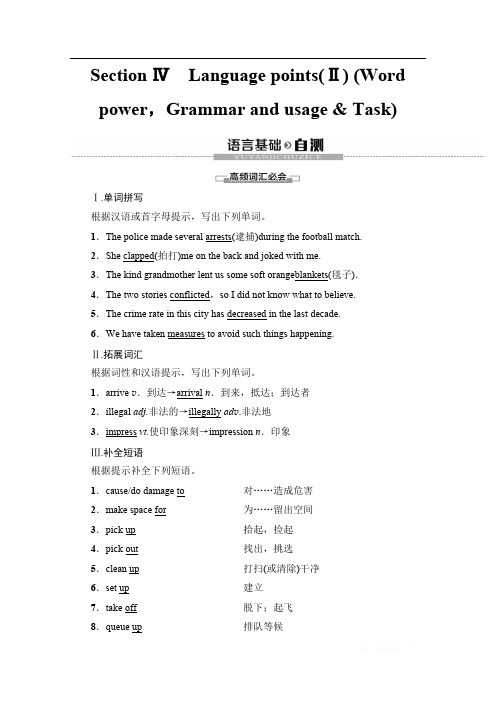
Section Ⅳ Language points(Ⅱ) (Word power,Grammar and usage & Task)Ⅰ.单词拼写根据汉语或首字母提示,写出下列单词。
1.The police made several arrests(逮捕)during the football match.2.She clapped(拍打)me on the back and joked with me.3.The kind grandmother lent us some soft orangeblankets(毯子).4.The two stories conflicted,so I did not know what to believe.5.The crime rate in this city has decreased in the last decade.6.We have taken measures to avoid such things happening.Ⅱ.拓展词汇根据词性和汉语提示,写出下列单词。
1.arrive v.到达→arrival n.到来,抵达;到达者2.illegal adj.非法的→illegally ad v.非法地3.impress vt.使印象深刻→impression n.印象Ⅲ.补全短语根据提示补全下列短语。
1.cause/do damage to 对……造成危害2.make space for 为……留出空间3.pick up 拾起,捡起4.pick out 找出,挑选5.clean up 打扫(或清除)干净6.set up 建立7.take off 脱下;起飞8.queue up 排队等候Ⅳ.选词填空选用上述短语的适当形式填空。
1.The explorers set up a base at the foot of the mountain.2.Through some efforts,rescuers cleaned up the ruins carefully which covered the injured.3.It was not until she took off her glasses that I realized she was a famous film star.4.Thanks to her perfect figure,she was picked out from thousands of applicants for the job.1.The state of our parks is very shocking,with rubbish everywhere.我们公园到处都是垃圾的情形令人非常震惊。
Unit 4 Language points 2 课件-江苏省2020-2021学年高一英语牛津译

credit n. praise or approval because you are responsible for sth. good that has happened 赞扬;称赞;认可
① Credit will be given in the exam for good spelling and grammar.
① How many people were involved in the staff cutback?
这次裁员涉及多少人?
② This project involves a lot of complex technical problems.
这个方案牵涉到许多复杂的技术问题。
2. Of course, if we make good things, it is not only to the credit of science…
认为……是理所当然的
① He just took it for granted that I would follow his advice.
他还想当然地认为我会听从他的建议
② I take it for granted that they would support this idea.
我认为他们理所当然地会赞成这个想法。
……但它本身并不附带使用说明。
apply vt. to use sth. or make sth. work in a particular situation 使用;应用
① We should try to learn economic theory and apply it.
我们应努力学习经济理论并能应用。
Unit+4+Reading+Language+points+牛津译林版(2020)选择性必修第一册
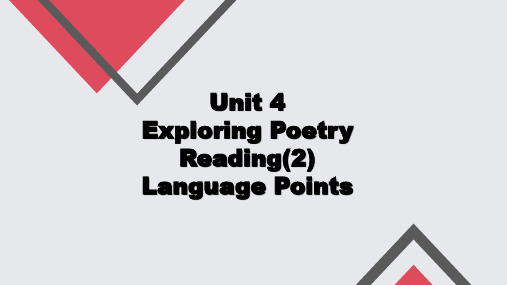
the words on the page. So, how to reveal this hidden dimension?
译文:诗歌是“音”与“意”的融合。与其他任何文学类型 相比,诗歌通常隐含着超越字面的更深层含义。那么,如何 揭示隐藏的这个方面呢?
or other special effects? All of these are good qualities to notice,
and they may lead you to a better understanding of the poem in
the end.
译文:你发现韵律了吗?有没有重复词、押韵或其他特别 的效果?所有这些都是值得注意的特质,并且它们可能最 终会引导你更好地理解这首诗。
……的结合
• combine A with/and B 把A和B结合起来
• be combined with
与……结合
e.g., The trip will combine business with pleasure. 此次旅行将把出差和娱乐结合起来。
Para.1
1. Poetrபைடு நூலகம் is a combination of “sound” and “sense”. More than any
解释;说明;阐明
e.g., She couldn't speak much English so her children had
to interpret for her.她讲不了几句英语,所以她的孩子们
得给她翻译。
高中英语复习提升-Unit4 language points1
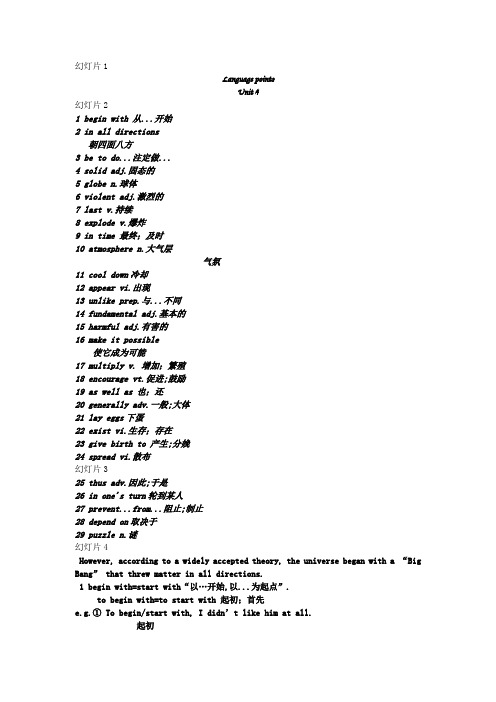
幻灯片1Language pointsUnit 4幻灯片21 begin with 从...开始2 in all directions朝四面八方3 be to do...注定做...4 solid adj.固态的5 globe n.球体6 violent adj.激烈的7 last v.持续8 explode v.爆炸9 in time 最终;及时10 atmosphere n.大气层气氛11 cool down冷却12 appear vi.出现13 unlike prep.与...不同14 fundamental adj.基本的15 harmful adj.有害的16 make it possible使它成为可能17 multiply v. 增加;繁殖18 encourage vt.促进;鼓励19 as well as 也;还20 generally adv.一般;大体21 lay eggs下蛋22 exist vi.生存;存在23 give birth to 产生;分娩24 spread vi.散布幻灯片325 thus adv.因此;于是26 in one's turn轮到某人27 prevent...from...阻止;制止28 depend on取决于29 puzzle n.谜幻灯片4However, according to a widely accepted theory, the universe began with a “Big Bang” that threw matter in all directions.1 begin with=start with“以…开始,以...为起点”.to begin with=to start with 起初;首先e.g.① To begin/start with, I didn’t like him at all.起初②—Why do you love No.9 Senior High School?—To begin with, teachers in our school are so friendly. ...= first of all 首先2 in all directions 四面八方;eg: Your classmates might be in all directions.幻灯片53 was to become3 (sth) be to (do):1. 注定要发生或必须发生They were never to meet again.2. 表示按计划、安排要发生的动作We are to meet at the school gate.3. 表命令The room is to be locked. (这个房间要上锁。
上外全新版大学英语综合教程讲义-book2-unit4
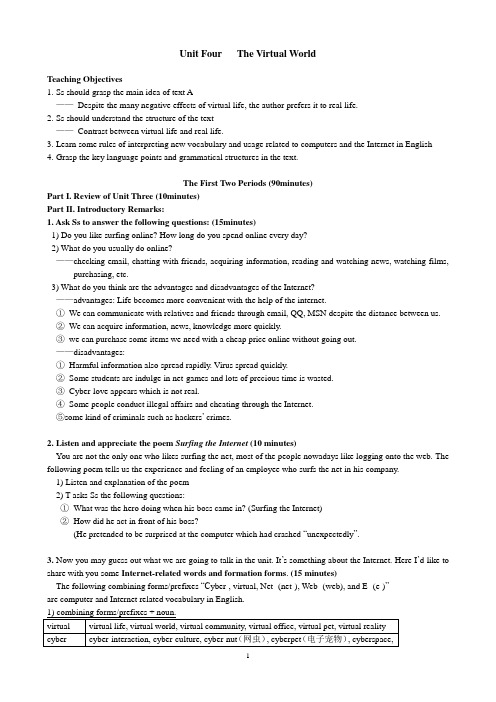
Unit Four The Virtual WorldTeaching Objectives1. Ss should grasp the main idea of text A——Despite the many negative effects of virtual life, the author prefers it to real life.2. Ss should understand the structure of the text——Contrast between virtual life and real life.3. Learn some rules of interpreting new vocabulary and usage related to computers and the Internet in English4. Grasp the key language points and grammatical structures in the text.The First Two Periods (90minutes)Part I. Review of Unit Three (10minutes)Part II. Introductory Remarks:1. Ask Ss to answer the following questions: (15minutes)1) Do you like surfing online? How long do you spend online every day?2) What do you usually do online?——checking email, chatting with friends, acquiring information, reading and watching news, watching films, purchasing, etc.3) What do you think are the advantages and disadvantages of the Internet?——advantages: Life becomes more convenient with the help of the internet.①We can communicate with relatives and friends through email, QQ, MSN despite the distance between us.②We can acquire information, news, knowledge more quickly.③we can purchase some items we need with a cheap price online without going out.——disadvantages:①Harmful information also spread rapidly. Virus spread quickly.②Some students are indulge in net-games and lots of precious time is wasted.③Cyber-love appears which is not real.④Some people conduct illegal affairs and cheating through the Internet.⑤some kind of criminals such as hackers’ crimes.2. Listen and appreciate the poem Surfing the Internet(10 minutes)You are not the only one who likes surfing the net, most of the people nowadays like logging onto the web. The following poem tells us the experience and feeling of an employee who surfs the net in his company.1) Listen and explanation of the poem2) T asks Ss the following questions:①What was the hero doing when his boss came in? (Surfing the Internet)②How did he act in front of his boss?(He pretended to be surprised at the computer which had crashed “unexpectedly”.3. Now you may guess out what we are going to talk in the unit. It’s something about the Internet. Here I’d like to share with you some Internet-related words and formation forms. (15 minutes)The following combining forms/prefixes “C yber-, virtual, Net- (net-), Web- (web), and E- (e-)”are computer and Internet related vocabulary in English.2) combining forms/prefixes + verb.Cybersurf (网络漫游), netsurf (网络漫游), websurf (网络漫游), email (发送电子邮件)3) “cyber”, “net”, etc. + suffix.cyberian (cyber+ian, 网络用户), cyberphobia (cyber+phobia, 电脑恐惧症),cybernaut (cyber+naut, 网络用户), cyberize (cyber+ize, 使联网),webify (web+fy, 使万维化), netter (net+er, 网民)4) Clipped words.Cyberdoc (cyber+doctor, 网络医生), netcast (net+broadcast,网络播放),netiquette (net+etiquette, 网规), netizen (net+citizen, 网民),netpreneur (net+entrepreneur, 网络企业家), webcam (web+camera, 网络摄像机), webliography (web+bibliography, 网络书目), webnomics (web+economics, 网络经济),webzine (web+magazine, 网络杂志), e-tailing (electronic+retailing, 电子零售),e-zine (electronic+magazine, 电子杂志).Part III. Detailed Study of Text A1. Leading in (2 minutes)As we have discussed just now, the Internet has its advantages and disadvantages. Some people think that the world Internet brings to us is not real, as the title of the Unit suggest, it’s a virtual world. Some of us like to live a life in contact with real things and real people, but others favor a virtual existence. Which life is better? I’m sure you have different opinions. Now let’s read Text A to find out what Maia Szalavitz has to say about these two life styles.2. Text Organization (15 minutes)Step one: Let students read the text quickly and try to find the answer to the following questions.1) How does the author manage her daily life?2) How does the author behave when she is suddenly confronted with real live humans?3) What does the author do to restore balance to her life?4) Does the author feel happy when she returns to the real world? Why and why not?Step two: T draws Ss’ attention to divide the text into four parts with reference to Text Organization 1 in page 107.Structure:Part 1: paras 2-3 description of the author’s virtual lifePart 2: paras1, 4-10, 13 how she feels about it after staying on the Net for a whilePart 3: para 11 what she does to return to the real worldPart4: para 12 how she feels about the real worldThe first paragraph tells about the consequences of living a virtual life and the last tells about the author’s return to it. Together, they show us the dilemma people are in: because of modern technology, we have a choice between a virtual life and real life, but we find both unsatisfactory. The author, however, finally has to choose the latter despite its negative effects.3. Cultural notes (see reference book)4. Analysis of the Text in Detaili) Analysis of Paragraph 1 (15 minutes)Step one:Ask Ss to read paragraph 1 and answer the following question:The author tells us that “after too long on the Net, even a phone call can be a shock”, How does shesupport the point in the following sentences?——My boyfriend’s accent, secretary’s clipped tone.Step two: paraphrase1) My boyfriend’s Liverpool accent suddenly becomes impossible to interpret after his easily understoodwords on screen.——After long time of reading his words on screen, it’s impossible for me to interpret his Liverpool accent all of a sudden.Attention: Adjectives followed by an infinitive active in form but passive in meaning.Adjectives like easy, hard, impossible, difficult and tough could be followed by an infinitive which is active in form but passive in meaning.(Refer to page 113, exercise III)…becomes impossible to interpret. = …becomes impossible to be interpreted.Step three: Language points1) virtual2) interpret: distinguish interpret and translate3) clipped: pronounce clearly 发音清楚的4) tone: distinguish tone (语气语调) and accent (口音)She took an angry tone with the reporters. 她带着怒气与记者说话He has an American accent. 他说话带美国口音5) rejecting: make other rejectreject: To refuse to accept, submit to, believe, or make use of.拒绝:拒绝接受,屈服,相信或使用e.g. reject an offer of help拒绝别人提供的帮助6) stretch: (cause to) become longer, wider, etc. without breakingstretch one's legs: 伸长腿; 出去遛遛stretch out a helping hand: 伸出一只援助的手stretch every nerve to do sth.: 全神贯注地做某事7) highlight: An especially significant or interesting detail or event.最重要的或最有趣的细节或事件5. Homework: preview the rest part of the text (7minutes)1) Try to summarize the author’s feeling and behavior after long time on the net.2) Find out what does the author do to restore balance to her life?The Second Two Periods (90 minutes)1. Review (10 minutes)1) Please tell us the some prefixes and combining forms related to the Internet and computer. And cite some examples.2) Translate the following sentences①My boyfriend’s Liverpool accent suddenly becomes impossible to interpret after his easily woods onscreen.显示屏上看惯了我男朋友那些一目了然的文字,他的利物浦口音一下子变得难以听懂。
2019-2020同步译林英语必修四新突破讲义:Unit 2 Section Ⅳ Language points(Ⅱ)
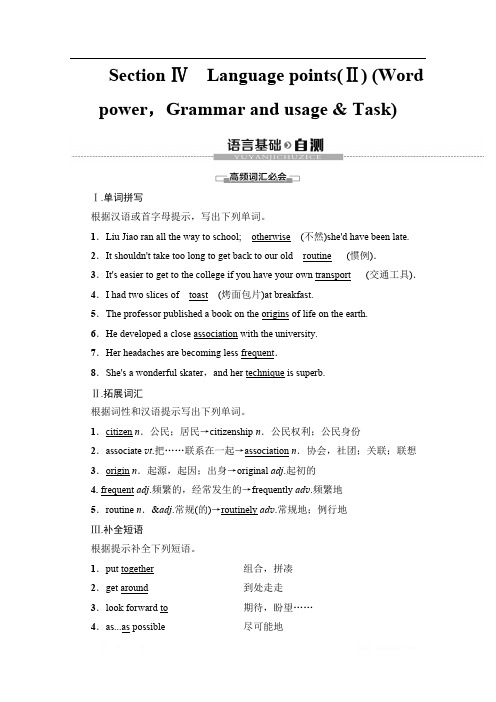
Section Ⅳ Language points(Ⅱ) (Word power,Grammar and usage & Task)Ⅰ.单词拼写根据汉语或首字母提示,写出下列单词。
1.Liu Jiao ran all the way to school; otherwise (不然)she'd have been late. 2.It shouldn't take too long to get back to our old routine (惯例).3.It's easier to get to the college if you have your own transport (交通工具).4.I had two slices of toast (烤面包片)at breakfast.5.The professor published a book on the origins of life on the earth.6.He developed a close association with the university.7.Her headaches are becoming less frequent.8.She's a wonderful skater,and her technique is superb.Ⅱ.拓展词汇根据词性和汉语提示写出下列单词。
1.citizen n.公民;居民→citizenship n.公民权利;公民身份2.associate v t.把……联系在一起→association n.协会,社团;关联;联想3.origin n.起源,起因;出身→original adj.起初的4. frequent adj.频繁的,经常发生的→frequently ad v.频繁地5.routine n.&adj.常规(的)→routinely ad v.常规地;例行地Ⅲ.补全短语根据提示补全下列短语。
- 1、下载文档前请自行甄别文档内容的完整性,平台不提供额外的编辑、内容补充、找答案等附加服务。
- 2、"仅部分预览"的文档,不可在线预览部分如存在完整性等问题,可反馈申请退款(可完整预览的文档不适用该条件!)。
- 3、如文档侵犯您的权益,请联系客服反馈,我们会尽快为您处理(人工客服工作时间:9:00-18:30)。
peace n. peaceful adj. 安宁的,和平的 peace-loving 爱好和平的 keep/break the peace 维持治安/破坏治安 in peace 和平地,安详地 be at peace/war 处于和平/战争状态 make peace with 讲和,言归于好 这两国已和平相处多年了。 The two countries have been at peace for many years. I live in an old city where people of different cultures have lived together in peace for centuries.
• 10. stomach (复数stomachs) n. 胃;肚 子,食欲,胃口,欲望,志趣 • 他踢比尔的腹部。He kicked Bill ____________________. in the stomach • 现在我什么都不想吃。 I have no stomach for any food now. ______________________________. • have a good stomach for 很想吃, 渴望 • have no stomach for sth. [to do sth.] 不 想(做某事), 对(某事)无兴趣 • lie flat on one's stomach 俯卧 stomachache胃痛;腹痛
4. reserve n. 保护区 the nature reserve 自然保护区
reserve v.保留,储备,预定(座位,住处)
reserve留一些钱以备将来需要是使用。 You had better reserve some money for future need. 这些座位是留给贵宾的。 These seats are reserved for special guests. reservation 保留地;预订(n.) reserved 预订的;说话不多的;矜持的 unreserved 未预订的
2)The two parks are different in shape, but are the same in area _______(在……面积上).
zone表“地带,地区”, 常可与area换用。但zone更侧重 表示具有某一特征、目的或用途的地区。在表示 “(地理名词)寒带、热带”时,常用zone。如: time zone时区,the torrid zone 热带。
• • • • • • • • •
1.decrease 反义词:________________ increase 1).vt/ vi降低,(使)减少,(使)变小 这些措施有助于降低生产成本。 These measures will help ________________________. decrease the cost of production 过去十年汽车变小了 have decreased In the last ten years ______________ in size. 2). 减少;减少的数量 a decrease in our imports There has been___________________. 我们的进口减少了.
12. mercy n. 仁慈;慈悲 show mercy to sb. 对某人起了怜悯之心 at the mercy of 任…处置;无能为力 仁慈的 merciful 残酷的,无情的:merciless They showed mercy to their enemies. 他们对敌人很仁慈。 The ship was at the mercy of the storm. 那只船在暴风雨中失去控制。
• 11.in relief 如释重负 • relief n • 1)(痛苦,负担等的)缓和,减轻;解除 • 药片减轻她一些痛苦。 The pills gave her some relief. _____________________________ • 2)轻松,宽心,慰藉 • 一听到消息,他如释重负地松了口气。 • Hearing the news, he breathed a sigh of relief _______________________. • 3) 救济物品,救济金 [U] • 救济物品被空运到洪水泛滥区。 Relief was flown to ________________ the flood-hit areas.
3) leave+宾语+副词 他总是开着灯就睡着了。 ________________________________ He always slept leaving the light on. 4)leave+宾语+现在分词 别让水一直流着。 Don’t leave the water running. __________________________________________ 5)leave+宾语+过去分词 干工作千万不要半途而废。 Never leave your work half done. _________________________________________ 6)leave+宾语+不定式 你最好让他自己做决定。 ________________________________________ You had better leave him to make his own decision.
• 3) long for sb. to do sth.______________ 盼望某人做某事
• 她渴望丈夫早日归来。 She longed for her husband to return home. • _____________________________________
• 9. fur n.(某些动物的)浓密的软毛;毛;毛皮 a fur coat • 毛皮大衣_________________ • 词语辨析:fur, feather • fur 指动物的软毛,feather指鸟类的羽毛 fur • The dog with thick_________ is Tom’s. feathers • The bird has beautiful___________. feather • Birds of a ___________ flock together. 物 以类聚,人以群分。 a feather • lighter than________________ 轻于鸿毛 • fur and feather 兽类与禽类
Reading
• 8. long v._____________ 渴望,盼望 • 1) long to do sth.______________ 盼望/渴望做某事 • 我渴望再见到她。 ________________________________________ I long to see her again. • 2) long for sth. _________________ 渴望……,很想有…… • 他渴望成名。 __________________________________________ He longs for fame.
• 2. loss n.损失,遗失,丧失/损失的人或事物
妻子的死对他是个巨大的打击 The loss of his wife was a great blow to him. ______________________________________ a sense of loss Many parents feel ________________(失落感) when their children leave home. make up the loss He is trying to ___________________. (弥补损失) at a loss _________________ 茫然,不知所措 They sold the goods at a loss. ( 亏本 ) He was at a loss for a suitable reply.茫然,不知所措 ( ) lost adj. 遗失的,失去的 ______________ 埋头于,专心致治于 be lost in ______________
3.area n. 地区;范围;面积 What is the area of … ......面积是多少?
have /cover an area of 占地面积为 What is the area 1) ______________(面积是多少) of this temple? It ___________________two square kilometers. has/covers an area of
•
• • • • • • •
5. about 30—40 remain in the wild after being left in peace with no hunting. leave … “让/使……处于某种状态”,后可接 ___________的复合结构 宾语+宾补 1)leave+宾语+名词 他惟一的亲人死了,什么也没给他留下。 His only relative died, leaving him nothing _________________________. 2)leave+宾语+形容词 不要把门开着,太冷了。 Don’t leave the door open ________________________, for it’s too cold.
• 13. suggest vt. 1) suggest 作“间接表明;建议;使想起”解时, 后面可以跟名词、代词或动名词作宾语。 That girl's sun-tanned face suggests excellent health __________________. (表明她身体非常健康) 她建议早一点出发。 She suggested an early start. _____________________________________ 我建议将运动会延期。 I ______________________________________ suggested putting off the sports meet
